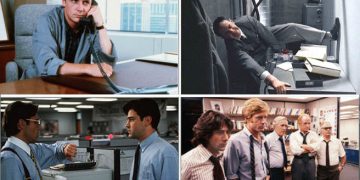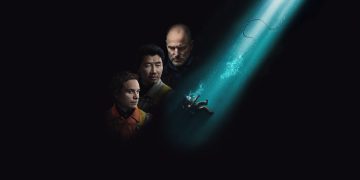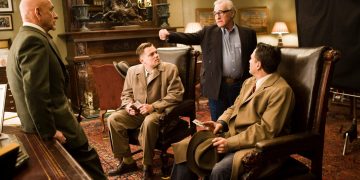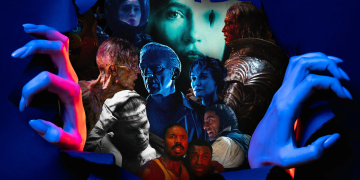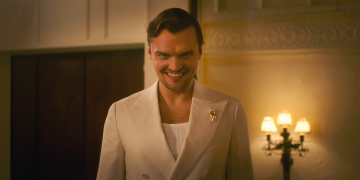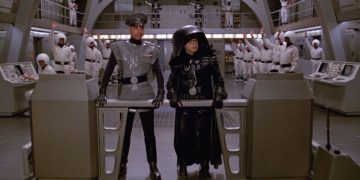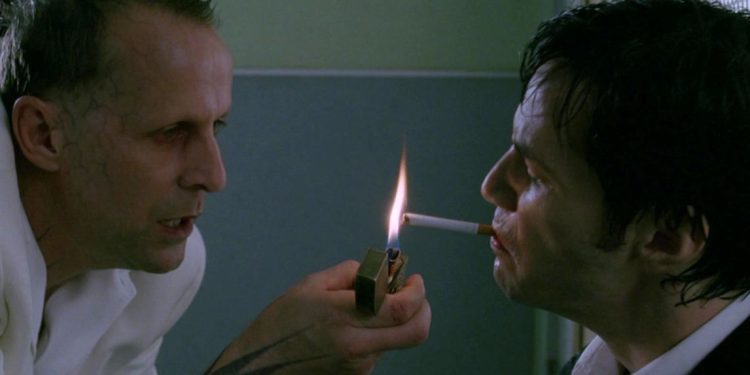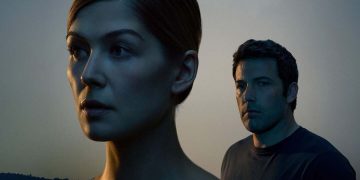John Constantine (2005) is perhaps one of Hollywood’s most regrettable works, with an investment of over $100 million but only earning about $230 million (based on statistics from Wikipedia). Part of this is because the film was released at the same time as Batman Begins by Christopher Nolan, so its commercial appeal was somewhat affected. However, the film itself is not lacking in substance; it leaves behind many reflections in the hearts of those who believe in philosophy, spirituality, and existence.
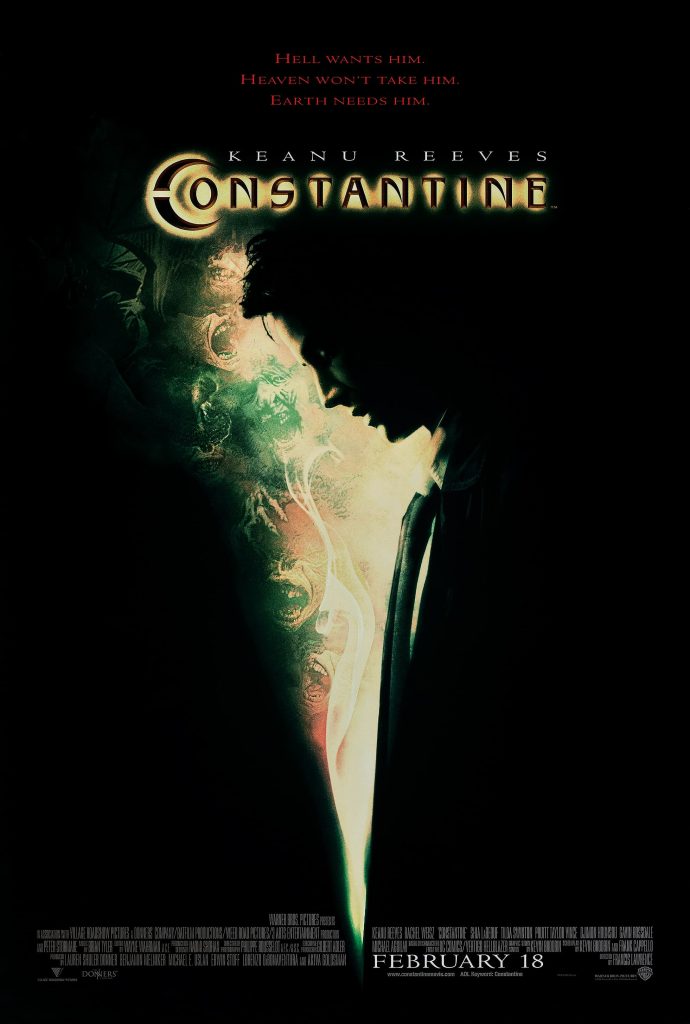
Constantine (2005) is a very long journey, depicting the character named John, a person with strong supernatural abilities, able to see both the mortal realm and hell, as well as the ethereal plane. Throughout this journey, John constantly confronts demons and lives with a mindset influenced by supernatural forces. Commit a sin, you encounter the afterlife. Have a repentant heart, and heaven awaits you. Between these two worlds, heaven is where humans have a more challenging struggle.
To put it simply, the characters become an essential element alongside the development of a complete plot.
Regarding the character John:
In the film, as I mentioned, John is a unique individual, but he doesn’t see himself as special; in fact, it’s more like a curse. John constantly blames his life, smokes a lot, and his life has never been as normal as other children since he was a child. John, therefore, attempted suicide for 2 minutes and was dragged down to hell for judgment. Since then, John realizes that both Heaven and Hell exist simultaneously, but humans just don’t feel it…
John also believes that the existence of supernatural forces and the war between these forces are utterly meaningless because the innocent, especially John’s friends like Chas Kramer and Beeman, have departed in vain due to the hands of Gabriel and the demon Balthazar. John is tormented by this, and he even doubts that God will save his soul because Gabriel declared that John would go to hell for the second time. But somewhere deep inside John, there is still a glimmer of hope, no matter how small. This is a very compelling detail in the film; it shows that even in the darkest moments, we can still hope and win to some extent against the forces of evil. That’s why John successfully persuades one of the most unpleasant and disciplined sorcerers, Papa Midnite. At the same time, it is because of the will to fight against evil that demons despise John and always threaten him with the breath of Hell.

Regarding the character of Gabriel:
Gabriel is perhaps the most noteworthy character in “Constantine.” Portrayed by Tilda Swinton, Gabriel possesses incredible power, with the ability to instill fear in almost any demon, excluding Lucifer himself. Gabriel even dares to summon Mammon, Lucifer’s son, to intimidate humanity. In the film, Gabriel is entrusted with preserving the virtues of God and spreading these good qualities to all beings. Things take a turn for the worse when the agreement between Heaven and Hell begins to crumble, and Gabriel’s faith in humanity starts to fade. On one hand, Gabriel still sees goodness within humans and wishes to help them, but on the other hand, Gabriel’s arrogance and trust in their own intelligence lead them to go against the initial divine principles set by God, ultimately causing Gabriel to renounce Heaven. Gabriel managed to save humanity through a somewhat twisted philosophy, but this also stemmed from unavoidable stagnation.
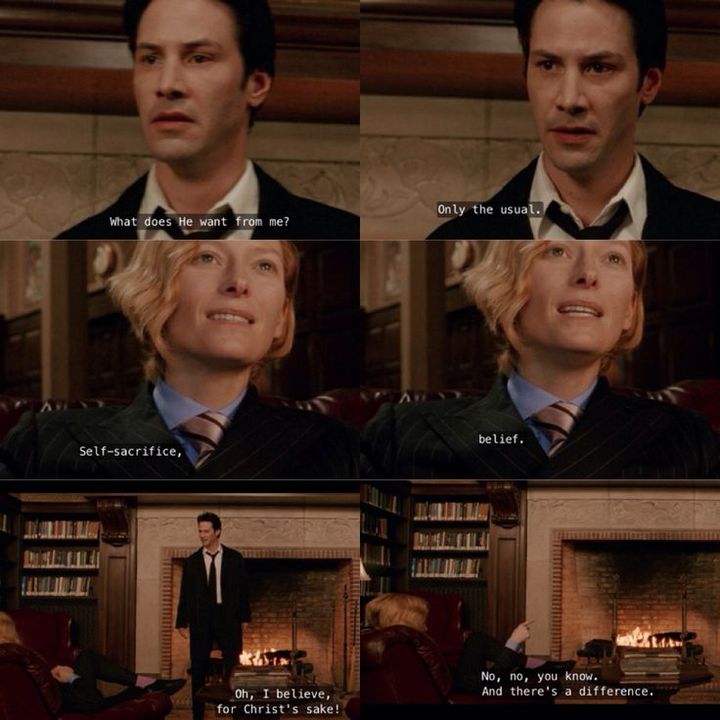
The question is: Is Gabriel pitiful or blameworthy? I think both. After all, in the end of the film, Gabriel had a second chance to redeem themselves. Gabriel is pitiful because they had to witness the rise of evil, just like John. Both Gabriel and John witness the price of war, bringing hatred and pain. Blameworthy, because Gabriel could have chosen a nobler solution, continuing to resist and hoping for some miracle, as John did. The film also explores another important element: anyone can fall due to suffering, dissatisfaction, despair, and fear. I am confident that in the sequel, Gabriel will return as a human being. The angel will surely experience countless debts and needs, and it won’t be easy or nearly impossible. However, striving for balance has never been easy or almost impossible, and it will take a long time to find a way out of that endless cycle
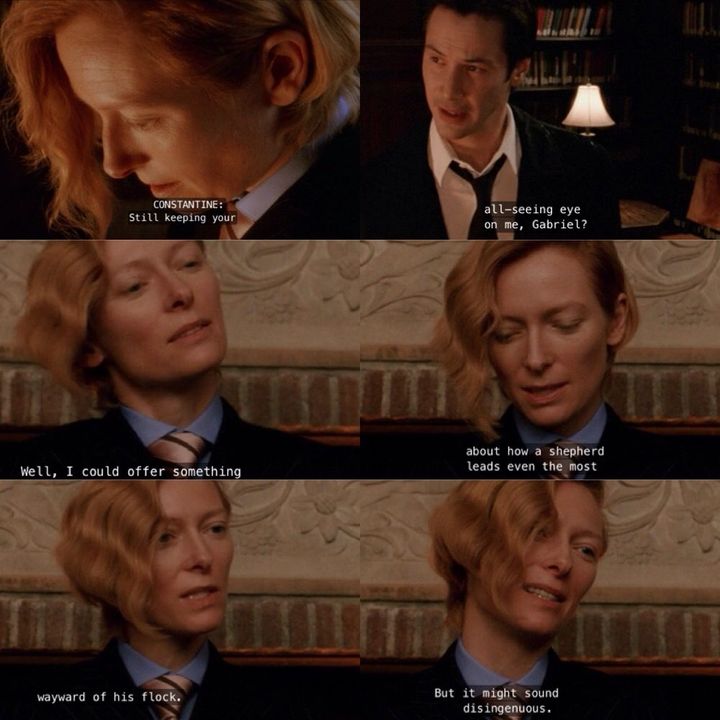
Regarding the character of Papa Midnite:
Papa Midnite has a rather intriguing role in the film. Midnite has a cold and sometimes ruthless personality, especially if someone causes trouble in his own nightclub. The film describes that he becomes a neutral figure after years of struggling with demons. It seems that both Papa Midnite and John, perhaps even Gabriel, are terrified by the tempting power of Lucifer, leading them to deal with the situation from their own unique perspectives. For Papa, he does not like demons or heavenly figures. He only does what is necessary for both sides, an ideal of harmony, fairness, and nonviolence. However, who can maintain it when everyone wants to become a powerful ruler, a world dominator? If he stays quiet, okay, maybe he will find temporary peace. But who knows, outside everything may be so chaotic that even he cannot control it. In that situation, do we sit idly by, or do we reluctantly resort to violence? To realize that striving for balance has never been easy or nearly impossible and it will take a long time to find a way out of that endless cycle.
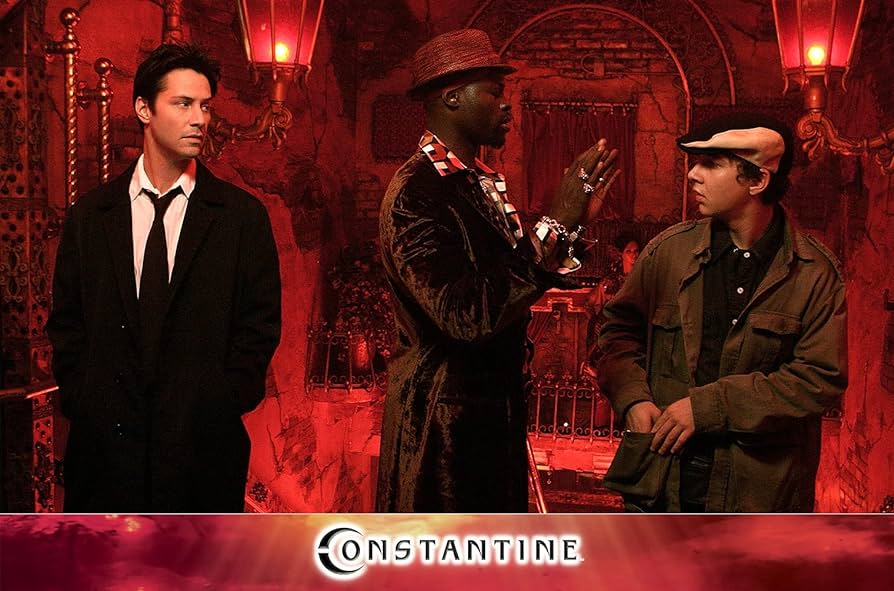
Regarding the character of Angela Dodson:
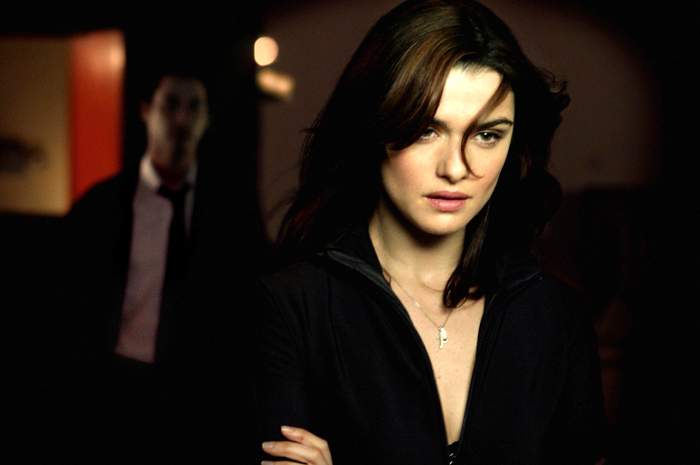
Angela Dodson is one of the main characters in the movie “Constantine.” She is portrayed as a professional and determined policewoman who helps the main character, John Constantine, in his battle against evil entities.
From the beginning of the movie, she is introduced as a woman who is capable of taking action and confidently handling tense situations. Angela loudly requests John Constantine’s help in finding her sister’s portrait, a sister who has mysteriously committed suicide.
However, during the investigation, Angela begins to realize that she and Constantine are dealing with a supernatural and more sinister entity than she initially thought. Gradually, she is drawn into another world and develops her own spirituality in dramatic action sequences.
One notable aspect of Angela’s character is her unwillingness and loneliness in her struggle. She is often ostracized or poorly treated by the men on her team, and even her superior. But that doesn’t stop Angela from seeking the truth and fighting for justice.
However, Angela also has limitations. She often relies too much on reason and materialism, believing that a scientific explanation can solve everything. This makes her struggle to accept unexplainable supernatural phenomena.
In summary, Angela Dodson’s character in the film “Constantine” is a poignant character filled with contradictions. She undergoes a process of learning and self-development, transforming from a woman dedicated to reason into a determined warrior in the world of demons and the supernatural.
About the character Chas Kramer:
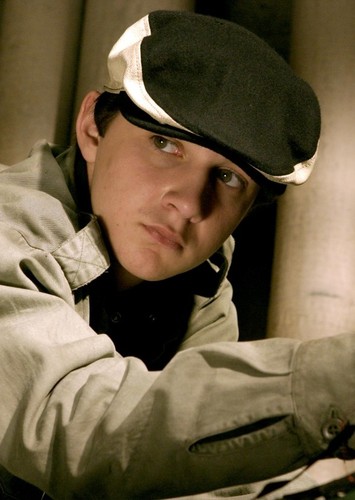
In the film “Constantine,” Chas Kramer is a close friend and ally of the main character, John Constantine. Chas is a dedicated and reliable taxi driver who is always ready to help Constantine in dangerous adventures to stop supernatural forces threatening the world.
However, Chas Kramer’s supernatural powers go beyond being a friendly shield for his group. Chas possesses the inexplicable ability to regenerate and heal serious wounds in a short time after experiencing supernatural phenomena. Of course, Chas can still die from much more terrifying forces.
Chas’s existence has brought many mysteries to those around him, especially John Constantine. In the context of the film world, discussing sudden supernatural abilities would make even characters rich in spirituality and understanding of the supernatural like Constantine face many difficulties in understanding and dealing with it.
In conclusion, Chas Kramer is a very special character in the film “Constantine,” and his presence brings many surprises and emotions to the audience. Chas goes to great lengths to help Constantine expel Lucifer’s son back to Hell.
About the demon character Lucifer:
Lucifer in “Constantine” is a very important character with a significant impact on the plot. He has the talent and power to dominate and control Hell and is considered a character with a malevolent but complex personality. He appears briefly but leaves a lasting impression on the audience. He defeats Gabriel and prevents Constantine from reaching Heaven. Similar to The Joker, he believes in the madness within humans, devoid of principles and filled with violence. Constantine is extremely cautious around him, and that’s why John always tries to kill enough demons to find a way to Heaven. As long as demons exist, evil will persist, and the battle lies ahead.
In conclusion, through the analyses above, I can draw some insights:
The movie “Constantine” conveys a deep message to the audience about the power of the spirit, courage, friendship, and sacrifice. The film focuses on the battle of John Constantine, a demon hunter, against evil and darkness, with the help of trustworthy friends on his journey to defy his destiny.
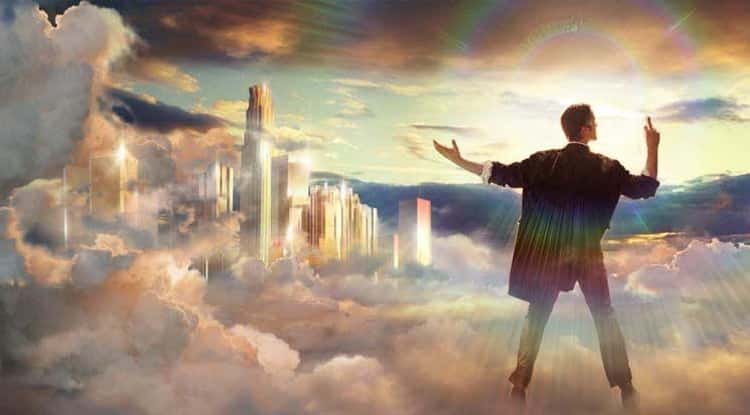
The spirit of unwavering perseverance without reward of John Constantine and his friends is a highlight of the film. The battle against evil is always lost without sacrifice and courage. The film conveys the message that, even when faced with challenges and difficulties, a person with courage and determination can overcome any adversity. The film also courageously raises questions about justice, the significance of supernatural forces, and human faith.
Some famous quotes from “Constantine”:
- “I guess God has a plan for all of us.” – Chas Kramer
- “Your life doesn’t mean jack to me. It’s just a flicker. But everyone’s life is valuable.” – John Constantine
- “I’ll believe in God when 1 and 1 are 5.” – John Constantine
- “We’re all going to die someday. Just some of us sooner than others.” – John Constantine

